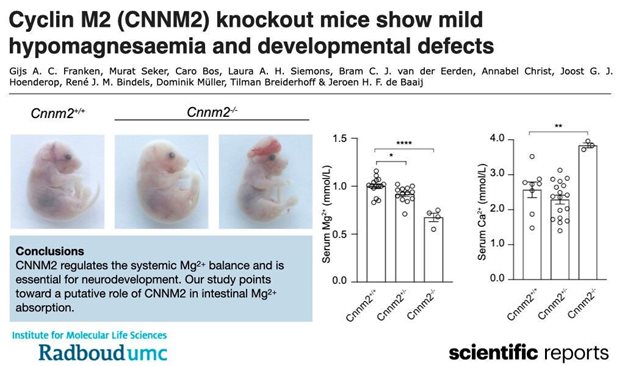
Gijs Franken and colleagues, theme Renal disorders, published in Scientific Reports that Cyclin M2 (CNNM2) is vital for embryonic development and magnesium homeostasis.
With the increasing attention to the role of magnesium in health, think of taking supplements to prevent fatigue or muscle cramps, it is important that we understand how magnesium levels are regulated within the body.
Magnesium (Mg2+) is a mineral that is crucial in many physiological processes, such as muscle contraction and blood pressure regulation. Mg2+ homeostasis is regulated by absorption in the intestine, storage in bone, and reabsorption from the pro-urine in the kidney. Within the kidney, the protein Cyclin M2 (CNNM2) is one of the key players in Mg2+ reabsorption. Pathogenic mutations in this gene are associated with decreased serum Mg2+ levels, called hypomagnesaemia, and excessive urinary Mg2+ wasting. Moreover, recessive mutations are linked to structural brain defects, such as myelinisation abnormalities. Yet, the role of CNNM2 in physiology has not been identified.
In our study, we employed several Cnnm2 knock out mouse models to investigate the role of CNNM2 in Mg2+ homeostasis. The cruciality of CNNM2 during embryonic development became evident, as approximately 30% of embryos demonstrated exencephaly. The few pups that were born alive, survived for less than 8 hours and showed decreased serum Mg2+ levels and increased calcium (Ca2+) levels. Adult mice heterozygous for Cnnm2 also showed decreased serum Mg2+ levels and increased Ca2+ compared to wild type littermates, independent of being fed with deficient or saturated Mg2+ diets. The kidneys were not able to compensate for the decreased serum Mg2+ levels and, interestingly, the faeces contained higher amounts of Mg2+.
In conclusion, CNNM2 is vital for embryonic development and Mg2+ homeostasis. Our data suggest a previously undescribed role of CNNM2 in the intestine, which may contribute to the Mg2+ deficiency in mice and patients. This also emphasises that congenital and acquired Mg2+ deficiencies, due to medications, might not only have a renal component, but also that the intestines play a role in the pathogenesis of hypomagnesaemia.

Related news items

Grants for heart and kidney research Two awards to Radboudumc in Open Competition ENW-XS
21 July 2022Two researchers from the Radboudumc receive a grant from the NWO within the Open Competition of the Exact and Natural Sciences. They are Thijs Eijsvogels, who studies the heart, and Pieter Leermakers, who studies the kidneys.
go to page
Grants for research on magnesium deficiency and malaria Vidis for Felix Hol and Jeroen de Baaij
1 July 2022 Radboudumc researchers Jeroen de Baaij and Felix Hol both receive an NWO Vidi grant for their research, respectively on magnesium deficiency in type 2 diabetes and on malaria. go to page
Human pluripotent stem cell-derived kidney organoids for personalized congenital and idiopathic nephrotic syndrome modeling
11 May 2022 Bart Smeets, Jitske Jansen and collegues, theme Renal disorders published this article in the Human Development. go to page
ERC Starting Grant awarded to Jeroen de Baaij
17 March 2022 Jeroen de Baaij, kidney researcher the Radboudumc, receives an ERC Starting Grant worth 1.5 million euros. He will use this grant to improve the diagnosis and treatment of severe magnesium deficiencies, which can lead to epileptic seizures and muscle cramps. go to page
Research on the development of kidneys in prematurely born children
17 February 2022 Michiel Schreuder, together with Maastricht UMC+, is now starting a study into the kidneys of these children. For this, the researchers received a grant from the Kidney Foundation. go to page
